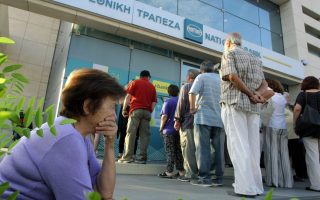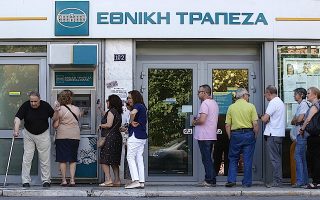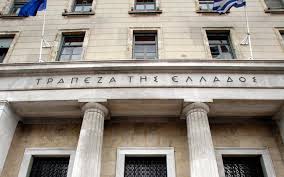Greek bank rescue won’t rely on taxpayer funds, Dombrovskis says

Euro-area taxpayers will be protected from losses on aid to Greek banks because of new European Union burden-sharing rules, EU Commission Vice President Valdis Dombrovskis said Wednesday.
“The principle of bail-in is being applied so that it’s not taxpayers which are first in line to pay for banking sector problems, but it’s actually the shareholders and bondholders of the banks,” Dombrovskis said in an interview.
Euro-area finance ministers are expected to sign off on the new Greek bailout on Wednesday evening, once the aid package has cleared legislative review in Germany and the Netherlands. European parliaments are voting this week to make as much as 86 billion euros ($95 billion) in rescue funds available to Greece, with the precise amount to be decided once the nation’s needs are assessed.
The bill for Greece’s three-year aid program would be reduced if the country regained access to the capital markets and if the International Monetary Fund contributed with its own package, according to European Commission spokeswoman Annika Breidthardt. It’s also not clear how much of the 25 billion euros set aside to recapitalize the banks will be needed.
Bondholder losses
“The total financing envelope of up to 86 billion euros is for the full duration of the program and it could turn out much less if things go well,” Breidthardt told reporters in Brussels.
Authorities are seeking to finish an analysis of the financial system and a recapitalization by the end of the year, according to an Aug. 14 statement by euro-area finance ministers. Whether any changes are needed to Greek bank laws will depend on the outcome of the bank assessment and stress test required by the bailout agreement, according to an EU official, who asked not to be identified because the review isn’t completed.
If the banks are recapitalized, the EU could apply new bail-in rules that determine investor losses. Under the terms of the Greek bailout, senior bondholders would immediately be in line for losses. Uninsured depositors would be protected until the EU’s Bank Recovery and Resolution Directive rules go into effect on Jan. 1, the EU official said.
Equity stake
The bonds of National Bank of Greece SA, Greece’s largest lender by market capitalization, plunged after finance ministers indicated senior debtholders could suffer losses. The bank’s 750 million euros of 4.375 percent securities due 2019 plunged to 44.6 cents on the euro at 10:22 a.m. in Athens, down from 65.9 cents on Aug. 14, according to data compiled by Bloomberg.
European authorities are on a tight deadline to evaluate Greek banks if they want to have access to the full range of aid funds. Of the bank money, 10 billion will be made immediately available, with a second installment of as much as 15 billion euros that would need to be used by Nov. 15, according to the Eurogroup statement.
None of the money will flow to the banks right away. Instead, the funds will be kept at the European Stability Mechanism and disbursed following a request by the European Central Bank’s supervision arm, an assessment by the European Commission’s competition division and approval by the ESM board of directors, according to ESM chief Klaus Regling.
If banks are recapitalized, European authorities will receive stakes in the banks that will be transferred to the privatization fund Greece is creating under the new bailout. That fund will not need to liquidate Greek assets right away, and instead can hold onto them until markets improve.
[Bloomberg]





